As gardeners, we all want to keep our gardens looking great for as long as possible. But for older folks, that task can be a little more difficult.
If you’re older, you may have difficulty bending down or reaching up, and you may tire easily. In addition, you may be susceptible to health problems such as arthritis or back pain.
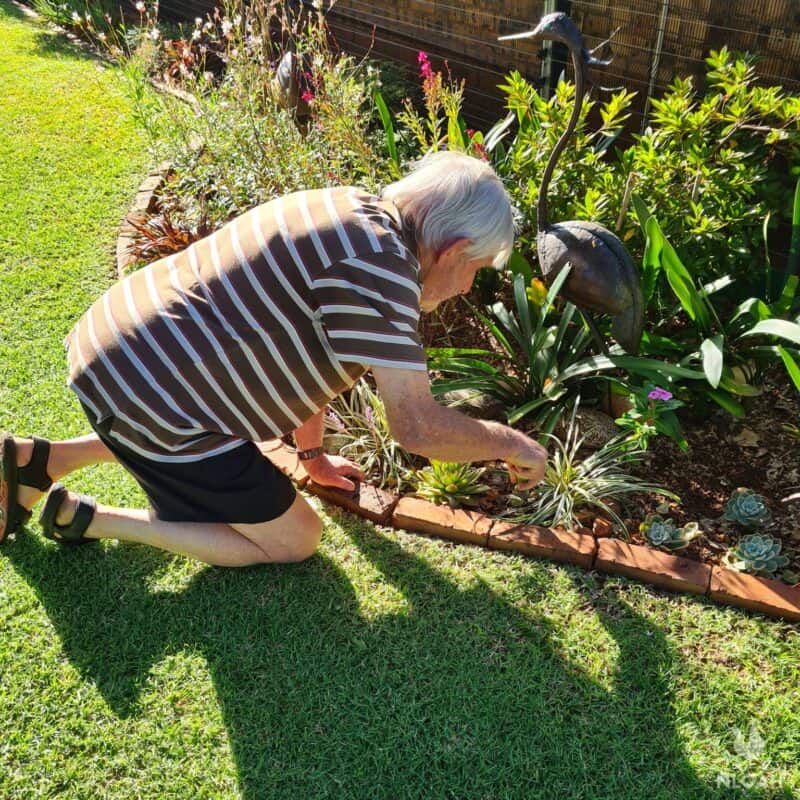
Your vision and hearing may not be as sharp as they once were, making it more difficult to spot pests or diseases.
As we age, our bodies become less able to withstand the physical demands of gardening in general, such as bending, stooping, and lifting.
Many older adults suffer from chronic health conditions that can make it difficult to garden for long periods of time.
Plus, gardening might just take longer as you get older, especially if you’re new to gardening and don’t already have an established plot.
Table of Contents:
So, Is Gardening Worth It for Older People?
If you’re getting on in years, don’t assume that you’re too old to start gardening (or to continue on with a hobby that you may have enjoyed for many years already!).
Gardening is actually a great tool to keep your body fit, your emotions in check (I’m watching my own dad struggle, and age definitely is having a massive effect on his emotions), keep your mind active, and keep social avenues open.
Gardening is a way to stay motivated to live your best life. The tasks of tending the plants are soothing and relieve stress, the movements of stretching, digging, kneeling, and standing all help keep your body supple and flexible. It strengthens muscles, joints, and bones.
By strengthening muscles and joints, your balance can be maintained for longer. This means the risk of falls is reduced.
Two of the most valuable effects of gardening if you’re older are that keeping fit helps relieve pain and it helps keep the mind focused and able to pay attention.
In this post, I’ll tell you about a few ways you can stay healthy while gardening at any age…
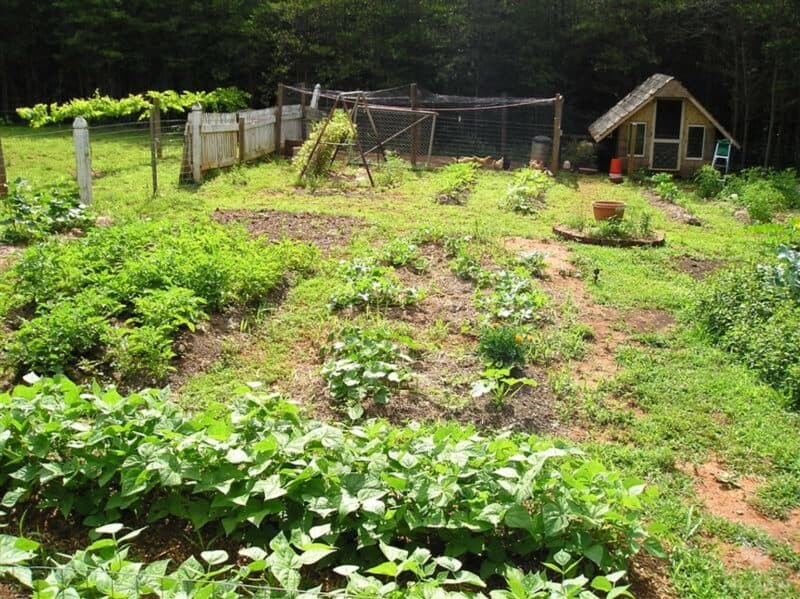
What to Consider When Gardening as an Older Adult
Although the benefits of gardening for older adults cannot be overlooked, there are a few considerations you’ll need to keep in mind…
For example, as you get older, your skin becomes fragile and thinner. You’ll be more susceptible to bumps, bruises, and sunburn. Fortunately, these can all be easily prevented with the right steps.
As you grow older, your vision changes, too, meaning you might need more eye protection or support when it comes to reading tiny seed packets, plant markers, and things of that nature.
You may find that you are more susceptible to temperature changes. It’s easier to become dehydrated or to suffer from heat exhaustion, so be sure to remain hydrated and wear proper sun protection when you’re working out in the garden.
Finally, falls are much more common. Your balance isn’t as good, and conditions like arthritis and osteoporosis may make it harder for you to remain flexible and move the way you used to.
Ways to Make Gardening for Older Folks Easier
Here are a few tips and tricks you can try to make gardening easier – even in your golden years.
Give Vertical Planting a Try
Vertical gardening is another great option to consider. If you have plants up at eye level, on trellises, poles, or archways, they will be far easier to tend to.
You can grow just about any plants vertically, but some of the best options are tomatoes, cucumbers, beans, and squash.
Use Raised Beds
One of the most difficult aspects of gardening for older folks is all the stooping, bending, and kneeling you have to do.
That can wreak havoc on the youngest person’s joints, let alone someone who is getting up in years! Not only that, but this can also present a significant fall risk.
Using raised beds is one way to get around this. It eliminates the need to stoop and bend while also improving soil drainage and taking up less space.
Using raised beds also reduces the risk of falling; they reduce the area for gardening which means the elderly do not have to walk far to garden; it also makes gardening more comfortable.
The beds should be six inches to one foot to make the beds comfortable, for taller people and those with limited mobility, beds can be made 18 to 30 inches high.
Stretch First
Gardening may not be as intense of an exercise as, say, running or weightlifting, but it’s still exercise. Stretch to reduce the risk of cramps and joint pain. Even a light, gentle walk can help your muscles limber up before you get to work.
Reduce the Lawn
Maintaining a grass lawn is a ton of work. As you get older, you may want to focus your efforts more on herbs, perennials, and vegetables.
Reduce the amount of grass you have that needs tending by planting herbaceous ground covers, like creeping phlox, or even woody ground covers like juniper. You can also plant low-growing herbs like wooly thyme.
Even hardscaping or xeriscaping can be advantageous for older adults. Things like gravel or stones serve as a gorgeous backdrop for container gardens, as do water features and low-maintenance trees.
Use Rotary Beds
Use rotary beds that revolve by pulling on a line, the use of a pulley system, or that can be rotated with the use of a hook.
Install Benches
Place plenty of benches in the garden for resting spots; these resting areas can be features in the garden where the elderly can sit and take in the beauty of the garden they are maintaining.
Make sure rest areas have plenty of shade, too.
Learn the Ideal Form
Posture is everything, especially when you are working in the garden. You can use a kneeler stool to help prevent strain to your knees, but you may want to try kneeling on just one knee. If you squat, keep your heels on the ground.
When you’re pruning, keep your wrist straight, not bent, and if you are using other tools, avoid stooping so that you don’t strain your back.
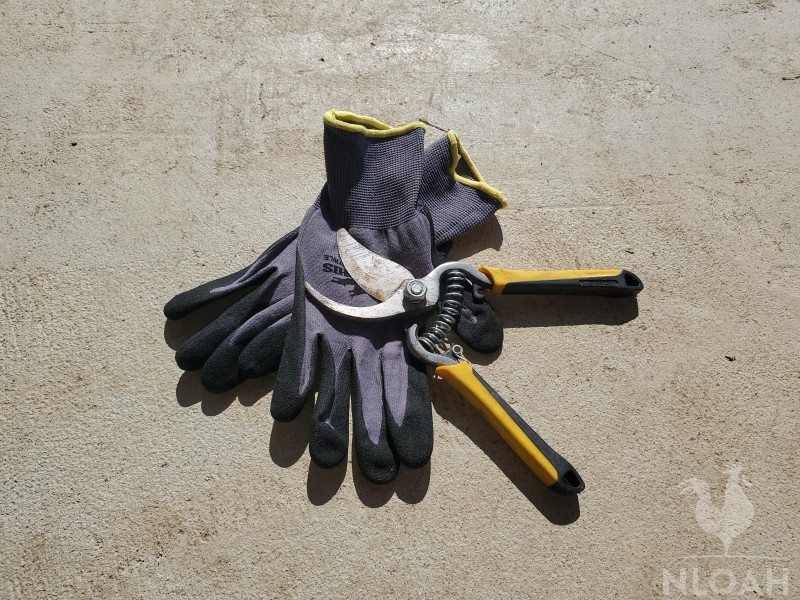
Wear Gloves
Don’t forget about gardening gloves! Put on a pair of durable gardening gloves before you get to work. This can protect your hand against branches, thorns, roots, and brambles.
Don’t Forget About Hanging Baskets
Hanging baskets are also great options for older adults. There are even retractable baskets that will make it easier for you to tend to your plants.
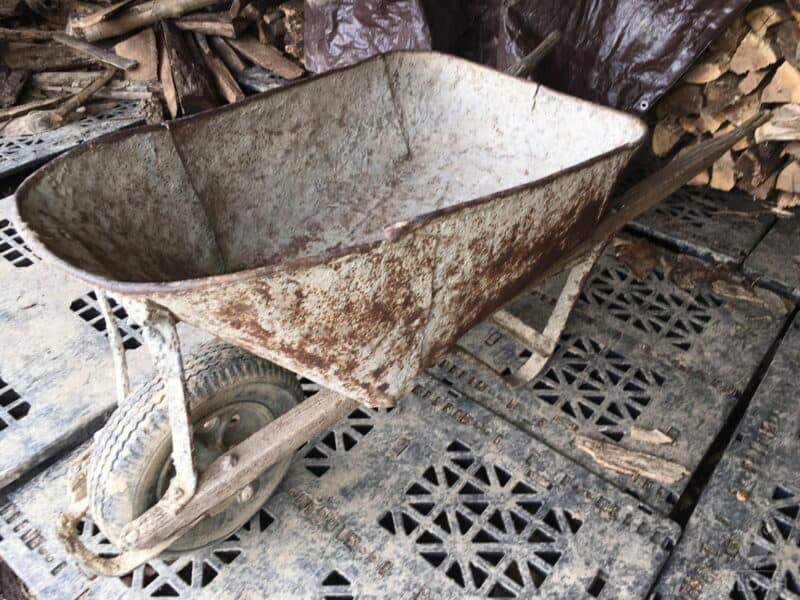
Put it On Wheels
If you don’t have a wheelbarrow or garden cart yet, get one!
These wagons can be super helpful when you need to move tools and plants around the yard – you won’t have to take ten thousand trips back and forth.
These can be purchased at a variety of different heights and weights, so it should be easy for you to find what you need.
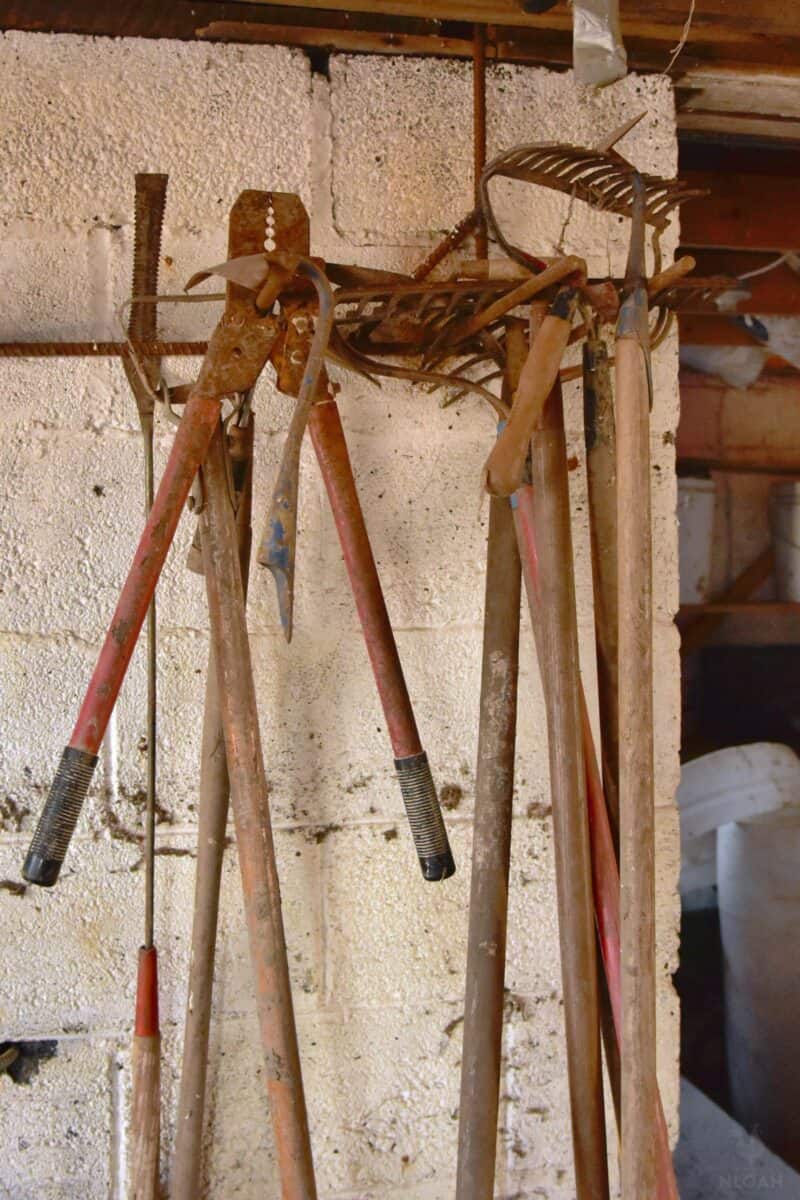
Use Adaptive Tools and Equipment
Invest in the right tools for gardening. Buy ergonomic and lightweight tools, ideally those with adaptive capabilities.
Even tools that have rubber handles instead of no handles at all can be beneficial. They can reduce the joint stress caused by raking, digging, and other activities, making gardening much easier on your body.
Long-handled garden tools can also be beneficial, as these will let you do most of your work without stooping or bending.
And if you’re suffering from vision loss, paint the handles a bright color. That way, they’ll stand out better among the green in your garden.
Modify Existing Tools When Possible
If you don’t want to rush out and buy new tools, know that you can modify the ones you already have. Use tape, foam, and plastic tubing to give yourself a better grip on your tools.
Keep Yourself in the Shade
Whenever possible, make sure there are a few shaded areas in or near the garden. That way, you can take a break and relax, getting out of the sun as needed.
Place a few beds in shaded areas so that you or your elderly loved one are not in the sun all the time, especially if you have sensitive skin, sunburn easily, or if you have any skin conditions.
Of course, you’ll need to only plants that like this much shade in those particular beds.
Optimize Pathways
Pathways should be clear of obstructions and the width should accommodate wheelchairs; it is safer to pave walkways to eliminate rogue roots; while an elderly person is not in a wheelchair now, that doesn’t mean they won’t be in a wheelchair five months from now.
If they have put in time and effort in the garden and now they cannot get into the garden because a wheelchair will not fit, they can be devastated in a way that will affect their emotions, their cognitive skills, their activity levels, their ability to still get exercise, their socialization, and even their will to live.
Pave your pathways so that are level, smooth, and slip-proof.
Buy Stable Tables and Chairs
Make sure you have some stable tables and chairs on hand to use for propagating plants, transplanting seedlings, and taking breaks.
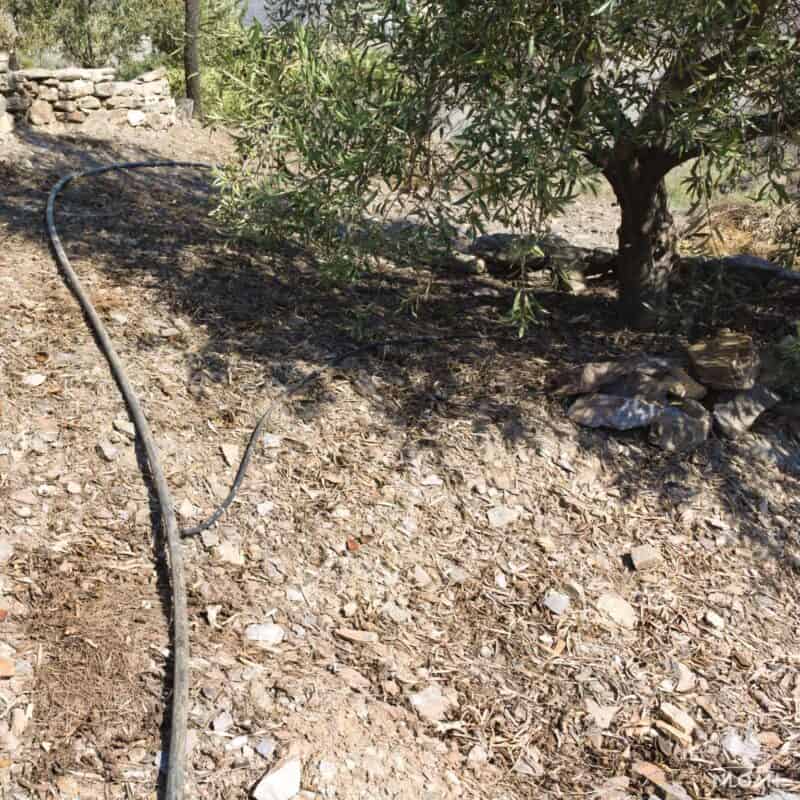
Install Irrigation Close to the Garden
Don’t force yourself to schlep a long distance back and forth between the garden and your irrigation system.
Install sprinklers in the garden with accessible shut-off valves t o make your work a bit easier.
Attend to Bites and Sunburns Immediately
Although you should do your best to avoid insect bites and sunburns, they will inevitably still happen. If they do, tend to them immediately.
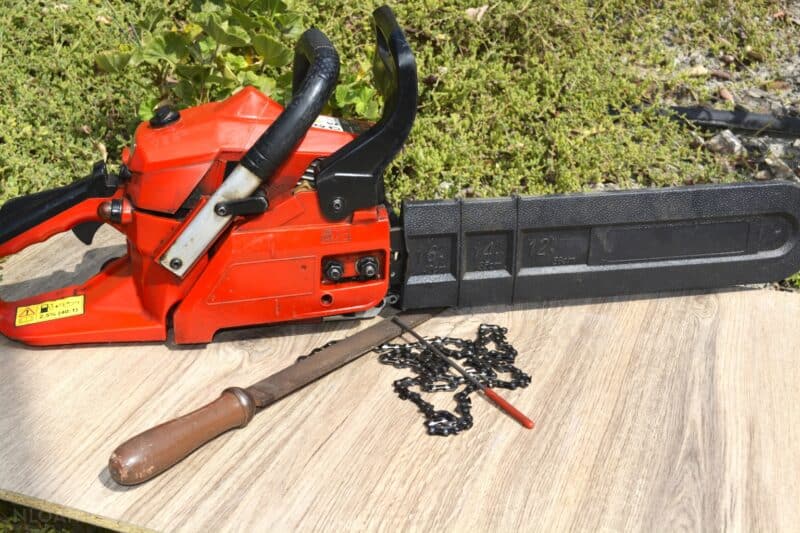
Be Careful Using Power Tools
Be mindful of the risks of power tools – and don’t use them without letting a friend or family member know about it first.
Do a Safety Check
Before you begin gardening each day, take the time to do a cursory safety check. Look for areas where the ground is uneven, where branches have fallen, or where there are loose rocks.
Secure All Fences and Gates
If memory loss is a problem for you – or starting to become a problem – make sure you have measures in place to ensure that all gates and fences are properly secured.
Use a Cane or Walking Stick
Uneven ground? Give yourself some additional support when you’re walking in difficult areas.
You can even use a ski pole – as a bonus, the pointed tip will help you pick up trash without having to bend over!
Avoid Ladders
As you get older, it’s more important than ever that you avoid ladders and climbing up on chairs or stools. Very few gardens are perfectly level. Don’t put yourself at a risk of a fall.
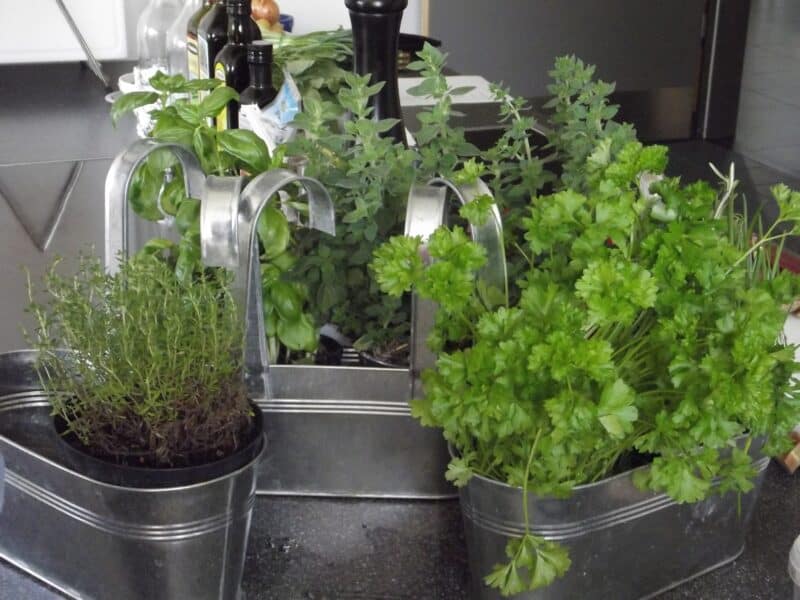
Consider Indoor Gardening
If the sun and extreme heat are just too much to bear, don’t assume that you need to do all of your gardening outdoors.
Indoor gardening is a great way to stay active and grow the foods you love to eat – but without extreme temperatures.
Watch the Walkways and Paths
Make sure all of your paths and walkways are flat, clear, and non-slip.
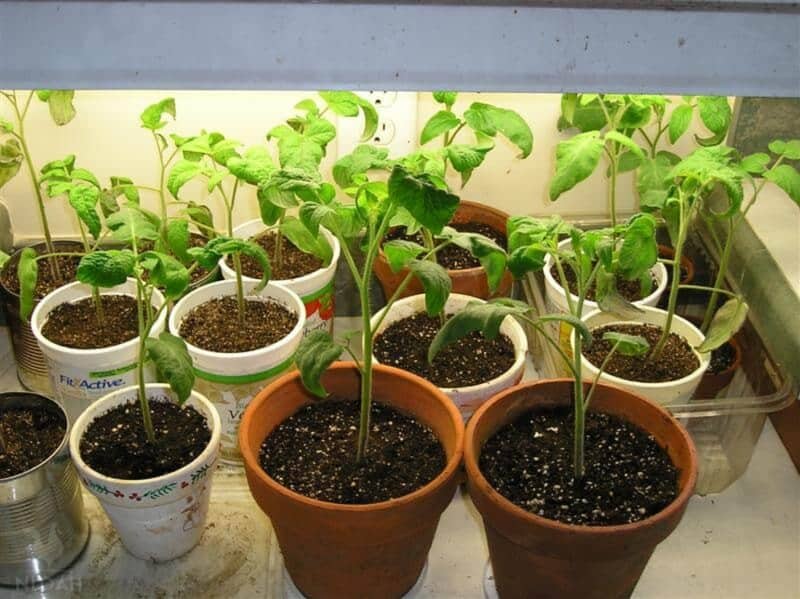
Grow a Container Garden
Container gardening is a great way to garden without all the physical exertion.
Make sure the container is large enough so it’s not easy to trip over it or knock it over. You can even plant your containers on planter caddies or doilies so they’re easy to move around.
Your container should be well-draining and easy to irrigate. You can install a drip watering system so you don’t have to bend and stoop to add water to each container.
Some indoor containers can even be equipped with self-watering systems!
Break it Up
Don’t feel like you need to tackle all of your planting and weeding in just one day. Feel free to break things up! Break it up into five or ten-minute pieces, taking breaks in between to relax or even switch to an easier task for a moment.
Wear Sunscreen and a Hat
Wear a full-coverage hat and sunscreen to protect yourself from the harsh rays of the sun.
Of course, it’s always a good idea to work in the garden when the sun is weaker and the temperatures are cooler.
Try to get all of your gardening done before 10 AM or after 4 PM. That way, you’ll be less likely to suffer from heat exhaustion or sunburn.
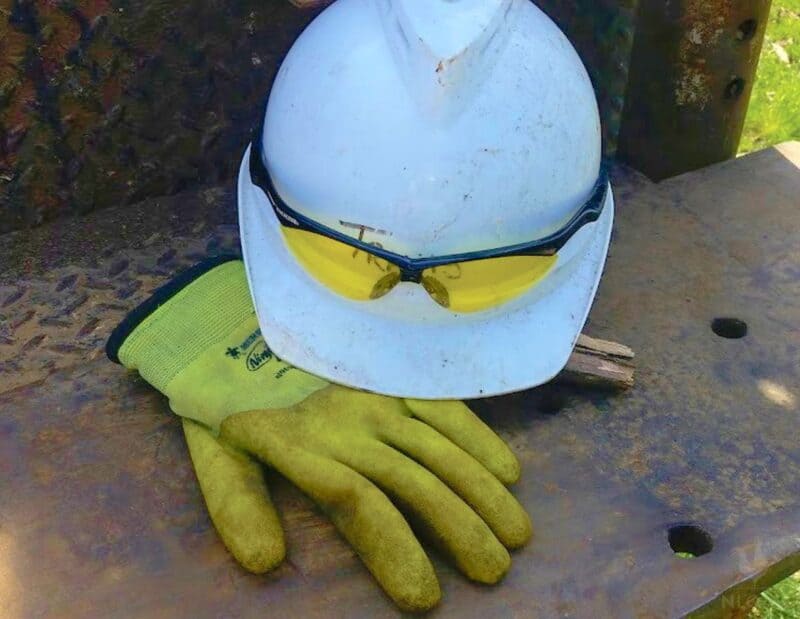
Wear Protective Gear
Protective gear while working in the garden is essential for everyone – not just for older adults.
Put on a hat, sunglasses, and a long-sleeved shirt and pants. This will protect you from the sun as well as from ticks, which can harbor diseases.
Store Equipment Safely
When you’re done gardening for the day, make sure all of your equipment is stored safely and in a spot where it can’t accidentally fall and injure you.
Don’t leave it on the ground in the garden. Not only does this cause your equipment to wear out faster, but you’re liable to forget where you stored it – making it a tripping hazard and a huge inconvenience, to say the least, alter on.
Delegate
Consider hiring a local teenager to help with big garden jobs like mowing the lawn, moving pots, pruning, and helping with more strenuous tasks.
Keep Others Informed
Always let other people know when you’re working in the garden, especially if you live alone. Carry a cell phone or panic button with you so you can call for help if you fall.
So many elderly people think they are fine and able to get to help if needed, but the sad reality is that they fall because they are elderly, and when they do, they can break bones easily making getting help impossible.
Have caregivers or other gardeners nearby for safety, if possible.
Be Easy On Yourself
Last but not least, give yourself some grace. Admit that you might not be able to do everything you used to – and that’s okay! You may find that you need to take more frequent breaks to relax.
You might not have the energy you had when you were 25 – but you’re not 25 anymore. Do what you can and be proud of yourself!
Gardening is Great at Any Age!
Gardening is a great way for older adults to get exercise, fresh air, and sunshine. It can also help them stay mentally stimulated and socially connected.
If you or an elderly loved one are interested in starting a garden, try these tips to get started.
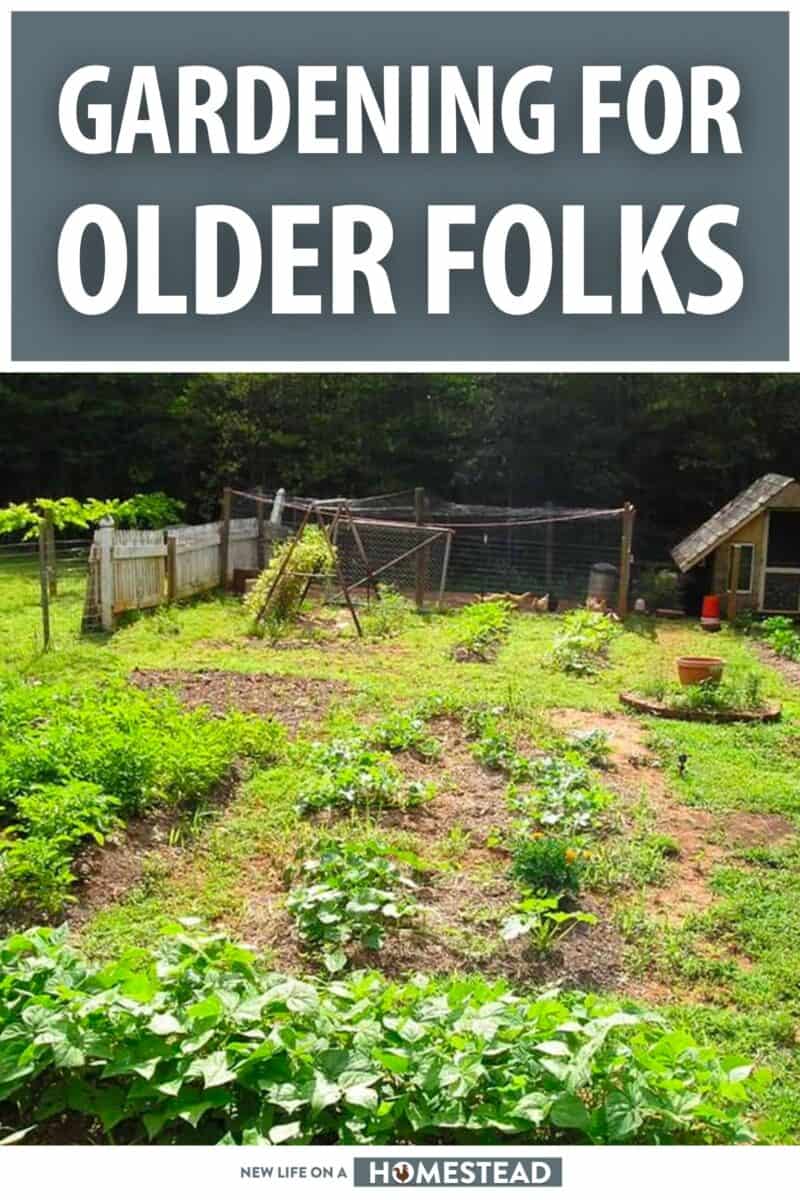

Rebekah is a high-school English teacher n New York, where she lives on a 22 acre homestead. She raises and grows chickens, bees, and veggies such as zucchini (among other things).
